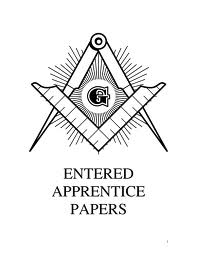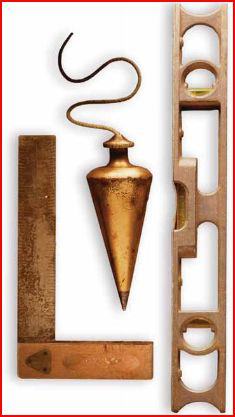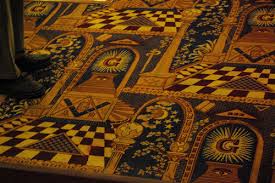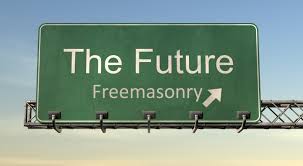Remembrance Day – Lest we ever forget





THE EMPTY CHAIR CEREMONY
A CEREMONY OF REMEMBRANCE
The Empty or Vacant Chair ceremony dates back to 1875, a decade after the close of the American Civil War when it was used in Masonic lodges to pay tribute to those who did not return from the war.
Since then it has been used by many lodges at Remembrance Day to pay homage to those Brother Masons who fell during WWI, WWII, and other conflicts; or it may be adapted to remember Past Masters or members. The version below is an amalgamation of some of these ceremonies, the Masonic memorial service of Ontario and some material added on for our particular use. What follows is a transcript of the ceremony as performed in Moira Lodge A.F. & A.M. #11 G.R.C. on November 7, 2001. Please feel free to copy it and modify it to suit your own ceremony of remembrance.
SET UP OF TYLED LODGE
An empty chair is decorated with an officer’s collar over the back. (Or appropriate apron) It is placed outside the closed door of the Lodge. A podium and wreath are placed in South East angle of the lodge.
THE CEREMONY
WM: Brother Deacons, you will approach the altar. Deacons approach altar (From the West).
WM: This evening we will be honoring the members of this lodge who fell during times of war (or raised to the Celestial Lodge above, as the case may be). As they have gone on to the Grand lodge above and can no longer attend this lodge it will be your duty to escort their symbolic representation to us, that we may pay them the respect they are due.
WM: Brother IG, you will permit the Brother Deacons to retire.
IG permits deacons to retire (Deacons Salute and retire by way of South).
ALARM caused by deacons returning with chair
WM: Brother IG, ascertain the cause of that alarm.
IG responds, speaks to the Tyler through the portal then says: Worshipful Master, Brothers who have fallen in service of their country seek admission here, not in person, but through their spiritual presence. They seek our continued remembrance. Through them they wish to honor the memory of our fallen Brother, JJJ of the Canadian Infantry who fell at the Battle of Vimy Ridge. (Or departed Brother(s) who answered the summons to the Grand Lodge Above)
WM: You will admit them.
WM raises Brethren Deacons advance to altar. (salute)
WM: Brother Deacons, you will advance to the east and place the symbolic representation of our fallen (departed) Brethren next to the podium.
Deacons advance to South East and place chair next to podium facing west.
WM seats Brethren.
WM: Brother Senior Warden, it is my order that in recognition of our fallen (departed) Brother’s presence, and his status as a Master Mason, that the apron of a Master Mason be positioned as it would be were our Brother present in body as well as spirit. You, (or a Brother), who has honorably served his country in uniform, will approach the seat of our Brothers’ memory, and perform the honor.
SW approaches podium.
SW: The Lambskin, or white apron, was the first gift of Masonry to our departed Brother. It is an emblem of innocence and the badge of a Mason. As our ritual tells us, it is more ancient than the Golden Fleece or Roman Eagle, more honorable than the Star and Garter. This emblem I place on the seat of our deceased Brother, a symbol of recognition of his dedication to the highest ideals of the Craft during times of war. (or his lifetime) Apron Placed on chair by SW.
SW: By this act we are reminded of the Masonic ideals of our fallen (departed) Brother and his fellows. We see in clear vision the Noble thoughts, generous impulses, words of truth, acts of love and deeds of mercy. The Masonic Apron represents these highest aspirations of a Brother in all ways,as each Brother knows they give to man his only genuine happiness, his lasting satisfaction. To these precepts our Brother willingly and gladly subscribed.
SW salutes and returns to his chair WM approaches the podium.
WM: Our Brother JJJ gave himself freely not only to the obligations of the Degrees of Masonry, but also to the obligations of service to his country in a time of need. He garnered the honors of his peers, his superiors and those who looked to him for leadership at home as well as on foreign shores. I now place these medals of honor as decorations to his Masonic Apron. It is said a Man is made a Mason first in his heart. The Mason may have earned honors before, or after he is raised to the Sublime Degree. But as the world sees, those honors do not decorate his Masonry, but rather highlight the spirit, which made both a Mason and a man of service.
WM places medals on apron returns to East.
WM: Brother Chaplain, you will approach the altar. Chaplain advances to altar.
WM: The Evergreen is an emblem of immortality. Beyond this world of shadows, man has a glorious destiny, since, within this earthly tabernacle of clay, there abides an imperishable immortal spirit, over which the grave has no power nor death dominion. Brother Chaplain, you will advance to the East, place the evergreen on our Brother’s apron, a symbol of the immortality of his soul and recite for the Brethren the 23rd Psalm.
Chaplain advances to chair and then to podium.
Chaplain: The Lord is my Shepherd; I shall not want.
He maketh me to lie down in green pastures:
He leadeth me beside the still waters.
He restoreth my soul:
He leadeth me in the paths of righteousness for His name’s sake.
Yea, though I walk through the valley of the shadow of death, I will fear no evil:
For thou art with me;Thy rod and thy staff, they comfort me.
Thou preparest a table before me in the presence of mine enemies;
Thou annointest my head with oil; My cup runneth over.
Surely goodness and mercy shall follow me all the days of my life,
and I will dwell in the House of the Lord forever.
Chaplain salutes and returns to his chair.
WM approaches podium.
WM: The brother to whom we pay tribute this evening was a member of this lodge. He was also a member of the (Canadian infantry who fought valiantly for control of Vimy Ridge during the First World War; or, substitute appropriate event). It was here that our Brother (lost his life fighting for the freedoms; or, substitute appropriate comment) so that we all can enjoy this evening in this lodge because of him and men like him. (This part may be used if the ceremony is in conjunction with Remembrance Day; otherwise, go to next part.)
Brethren, at this time of year it is traditional to wear the poppy as a symbol of remembrance, a tradition that was began as a result of the poem “In Flander’s Fields” by John McCrae. While it is also traditional to read that classic poem at this time of year, I would like to break with that tradition and instead read a poem written by Miss Moina Michael. Miss Michael was an American lady who was so moved by McCrae’s poem that she went out and bought 25 red poppies. She wore one herself and sold the other 24, thus starting the poppy fund as we know it today. She also wrote a poem of her own in response to In Flanders Fields, which I would like to now read to you.
Oh You who sleep, In Flanders’ fields
Sleep sweet to rise anew.
We caught the torch you threw.
And holding high we kept
The faith with those who died.
We cherish too, the poppy red
That grows on fields where valor led
It seems to signal to the skies
That blood of heroes never dies
But lends a luster to the red
Of the flower that blooms above the dead
In Flanders’ fields.
And now the torch and poppy red wear in the honor of the dead
Fear not that ye have died for nought:
We’ve learned the lesson that ye taught
In Flanders’ fields.
WM removes poppy and places on chair.
WM returns to east.
WM: Brethren, we will now have two minutes silence for Brother JJJ and for all Brethren who fell during foreign wars.
WM raises brethren. Moments silence signaled by 13 gongs of bell, 10 seconds apart.
WM seats brethren.
WM: Brethren, this concludes our ceremony of remembrance. I declare that order of business closed.
Source: themasonictrowel.com and the Home Page of the Grand Lodge of New Brunswick at glnb.org
====================================================
FROM ONTARIO (Many Thanks)
The District Deputy Grand Master of Frontenac District, Grand Lodge of Canada in the Province of Ontario, R.W.Bro. Rolland A. Morrow.
This was presented at his Official Visit to Prince of Wales Lodge No. 146 in Napanee, Ontario on the 2nd of November.
R.W.Bro Morrow speaks of Canadian Soldiers lost in time of war, and on our list we have members from around the globe, and am sure the each of you can relate to what his message is.
FULFILLMENT – REMEMBERING
Worshipful Master, distinguished head table guests and Brethren, two men are standing at the end of a bar talking. One says, “Did you hear three more soldiers died if Afghanistan?” The other one interrupts without a pause, and says, “Bartender, would you change the channel to see who won the game last night?”
It amazes me how fast we forget such critical events.
The families of those killed never forget. They wake up in the morning and go to bed every night and never forget. Can you imagine coming home from Afghanistan on a plane with a buddy, and he or she is below, in the belly of the plane, in a cold coffin draped with a Canadian flag. Just imagine the sacrifice.
I titled the address for this evening “Fulfillment/Remembering”
“A Letter from Afghanistan”
I quote “It was such an accident of birth that we ended up where we did, that we are, where we are now, with the choices that we have available to us. It seems to me that we have such a burden of responsibility, to make the world a better place, for those who were born into far worse circumstances. It is more than donating money to charities; it is taking action, and trying to make things better. You have shown me (my parents), that throughout my life, but here I realize it more than ever before.
I like to think my being here means they will be able to come that much sooner and operate more freely.
I look for opportunities to volunteer and to really make a difference. It is very humbling to be here, part of something so much bigger than myself.”
That, my Brethren, was penned by a Canadian, on May 2, 2006 by Captain Nicola Goddard, the first female killed if Afghanistan. That letter arrived home, after Nicola Goddard had given the supreme sacrifice.
When I was a teenager some 50 to 55 years ago I read with interest the following passage penned by The Right Honorable Vincent Massey, then Governor General of Canada. The message from that passage has stayed with me. It is as true today as it was some 50 plus years ago and has, I believe, stood the test of time. I’ll gender correct the passage as I share it with you.
Quote; “What sort of person do we wish our young Canadians to be? What will they be like if they embody the best in Canada around them? They will have some reverence for the past, a respect for what has gone before. They will have kept some of the simple virtues of an earlier time which will help them to sort out the real from the counterfeit. They will think for themselves, with respect for the views of others. They will work hard and play hard and know how to use their increasing leisure. They will have resources within them to keep them independent of the mechanized pleasure of the age. They will be able to laugh at the absurd and will become angry at the sight of injustice. They will not be ashamed of good manners. They will show an inherited instinct for freedom. They will nurse a personal devotion to the welfare and the safety of their country. They will have a deep and quiet belief in what she is about and what she can do.”
The Masonic degrees counsel us to acquire Knowledge and by applying knowledge in everyday situations receive the gift of Understanding. When these two forces, knowledge and everyday situations, come together Wisdom is formed. Throughout the degrees, we are encouraged to practice the gift of Love, the genuine concern for others, throughout this world. Finally, we are introduced to empathy for another person who sincerely requires help, in the gift of Compassion.
Nichola Goddard, was never, and will never, become a Freemason. She did, however, I believe, cultivate such attributes as Knowledge, Understanding, Wisdom, Love and Compassion that gave her inner peace, happiness, and self-fulfillment and for those who knew her; she gave joy and a blessing.
Canadian citizens and its Armed Services are dedicated to reach throughout the world, and where there is injustice and strife she will be called upon to uphold those values which she holds so dear in the minds of her people.
As we approach the Remembrance of those who served, and are serving this country Canada, let us work as Freemasons so that all who join our fraternity and all Canadians have a deep and quiet belief in what Canada is and what Canada can do for the world and its people.
Brethren, I thank you for the pleasure of having the opportunity of assembling with you this evening at Prince of Wales Lodge No. 146, and in sharing the richness of your Masonic Fellowship.
R.W.Bro. Roland A. Morrow D.D.G.M. Frontenac District Grand Lodge of Canada in the Province of Ontario November 2, 2011






St. Johns No4 has been doing the Empty Chair ceremony for several years now … each year we pick a soldier that was a member of our lodge that was killed in action (all were from WW1) and have him be the represent the fallen. A moving ceremony, and should be used more.
We actually had a former member that received a VC in WW1 … his dad was a PM of our Lodge and he joined upon his return … see attachments (commented below)
Stan Barclay
Attachment from Stan Barclay:
The Empty Chair Ceremony
A Ceremony of Remembrance
As Performed At St. Johns A.F. & A.M. #4 G.R.M. Nov. 4th, 2009
The Empty or Vacant Chair ceremony dates back to 1875, a decade after the close of the American Civil War when it was used in Masonic lodges to pay tribute to those who did not return from the war. Since then it has been used by many lodges at Remembrance Day to pay homage to those Brother Masons who fell during WWI, WWII, and other wars.
Set Up Of Lodge
• An empty chair is decorated with an officer's collar over the back. It is placed outside the door of the lodge.
• A podium and wreath are placed in South East angle of the lodge.
Empty Chair Ceremony
WM: Brother Senior Deacon & Stewards you will approach the altar.
S.D & Stewards approach altar.
WM: This evening we will be honoring the members of this lodge who fell during times of war. As they have gone on to the Grand Lodge Above and can no longer attend this lodge it will be your duty to escort their symbolic representation to us, that we may pay them the respect they are due.
WM: Brother JD, you will permit the Senior Deacon & Stewards to retire.
ALARM caused by S. Deacon & Stewards returning with chair.
JD: W.M. there is an alarm
WM: Brother JD you will ascertain the cause of the alarm.
JD: W.M., Comrades and Brothers who have fallen in service of their country seek admission here, not in person, but through their spiritual presence they seek our continued remembrance. Through them they wish to honor the memory of our fallen Brother, Private John Clark Leitch of the Canadian Army who died during in the First World War on 28 September 1918.
WM: You will admit them
WM raises Brethren (ooo)
S. Deacon & Stewards advance to altar.
WM: Brother S. Deacon & Stewards you will advance to the east and place the symbolic representation of our fallen Brethren next to the podium.
S. Deacon & Stewards advance to South East and place chair next to podium facing west … return to alter salute and return to seats.
WM seats Brethren (o)
WM: Brother S. Warden, it is my command that in recognition of our fallen Brother's presence, and his status as a Master Mason, that the apron of a Master Mason be positioned as it would be were our Brother present in body as well as spirit. You, will approach the seat of our Brother’s memory, and perform the honor.
SW approaches podium.
SW: The Lambskin, or white apron, was the first gift of Masonry to our departed Brother. It is an emblem of innocence and the badge of a Mason. As our ritual tells us it is more ancient than the Golden Fleece or Roman Eagle, more honorable than the Star and Garter. This emblem I place on the seat of our deceased Brother, a symbol of recognition of his dedication to the highest ideals of the Craft during times of war.
Apron Placed on chair by SW.
SW: By this act we are reminded of the Masonic ideals of our fallen Brother and his fellows. We see in clear vision the noble thoughts, generous impulses, words of truth, acts of love and deeds of mercy. The Masonic Apron represents these highest aspirations of a Brother in all ways, as each Brother knows they give to man his only genuine happiness, his lasting satisfaction. To these precepts our Brother willingly and gladly subscribed.
SW salutes and returns to his chair.
WM approaches the podium.
WM: Our Brother, John Clark Leitch, gave himself freely not only to the obligations of the Degrees of Masonry, but also to the obligations of service to his country in a time of war. He garnered the honors of his peers, his superiors and those who looked to him for leadership at home as well as on foreign shores. It is said a Man is made a Mason first in his heart. The Mason may have earned honors before or after he is raised to the Sublime Degree. But as the world sees, those honors do not decorate his Masonry, but rather highlight the spirit, which made both a Mason and a man of service.
WM returns to East.
WM: Brother Chaplain you will approach the altar.
Chaplain advances to altar.
WM: The evergreen is an emblem of immortality. Beyond this world of shadows, man has a glorious destiny, since, within this earthly tabernacle of clay, there abides an imperishable immortal spirit, over which the grave has no power nor death dominion. Brother Chaplain you will advance to the East, place the evergreen on our Brother's apron, a symbol of the immortality of his soul and recite for the Brethren the 23rd psalm.
Chaplain advances to chair places evergreen and then advances to podium.
Chaplain: The Lord is my Shepherd; I shall not want.
He maketh me to lie down in green pastures:
He leadeth me beside the still waters.
He restoreth my soul:
He leadeth me in the paths of righteousness for His name' sake.
Yea, though I walk through the valley of the shadow of death,
I will fear no evil: For thou art with me;
Thy rod and thy staff, they comfort me.
Thou preparest a table before me in the presence of mine enemies;
Thou annointest my head with oil; My cup runneth over.
Surely goodness and mercy shall follow me all the days of my life,
and I will dwell in the House of the Lord forever. Amen.
Chaplain salutes and returns to his chair.
WM: approaches podium.
WM: The brother who we pay tribute to this evening was a member of this lodge. He was also a member of the Canadian Army (Manitoba Regiment) 78th Battalion, during the First World War. Our Brother lost his life at the Pas de Calais in France on 28 September 1918, at age 33, fighting for the freedoms we all can enjoy this evening in this lodge because of him and men like him. Brethren at this time of year it is traditional to wear the poppy as a symbol of remembrance, a tradition that was began as a result of the poem "In Flanders Fields" by John McCrae.
IN FLANDERS FIELDS the poppies blow
Between the crosses row on row,
That mark our place; and in the sky
The larks, still bravely singing, fly
Scarce heard amid the guns below.
We are the Dead. Short days ago
We lived, felt dawn, saw sunset glow,
Loved and were loved, and now we lie
In Flanders fields.
Take up our quarrel with the foe:
To you from failing hands we throw
The torch; be yours to hold it high.
If ye break faith with us who die
We shall not sleep, though poppies grow
In Flanders fields.
WM removes poppy and places it on the chair then returns to east.
WM: (Or one of the veterans present?)
They shall grow not old, as we that are left grow old;
Age shall not weary them, nor the years condemn.
At the going down of the sun and in the morning
We will remember them.
WM:
Brethren we will now have two minutes silence for Brother William Grant and for all Brethren who fell during foreign wars.
WM raises brethren (ooo).
.
Secretary – Silence signaled by 13 gongs of bell 10 seconds apart.
WM seats brethren (o).
WM:
Brethren this concludes our ceremony of remembrance. I declare that order of business closed.
Recognize any veterans present …?
I enjoy your info very much.
My wife and I own a large section of a deserted town South West, called, Greenway
Hwy 23 and 342.
Sacred geometry is with us as we have made the Chartres labyrinth to the original scale.
We are probably 3/8ths to 1/2 inch out on some paths. just the 6 petals remain to do in the center.
Keep up the good work.
I was unable to get on the log in area, possibly as I am a novice on this thing and not on it regularly, 1 or 2 times a week.
yours fraternally,
Richard Shirray.
Thanks for your comments W. Bro. Richard …. you are now signed up and a member of the Secure Website.
We have a nice "Remembrance of the Ancients"…
from: Victor G Popow 12:10pm Nov 8
We have a nice "Remembrance of the Ancients" service at Templum Sion Lodge of Freemasons #186 where all members step up to the altar and are given a rose..they then deposit the rose on the chair in the north—the north is traditionally, in many cultures, the symbolic place of the dead, the underworld, the place of the gods, the divine feminine. The member is encouraged to think of someone or pay respects to family members and then goes back to their seat. We couple this with some words of respect that encourage us all to not only remember men who have died in military service but people who have given their lives in society for our security and safety…